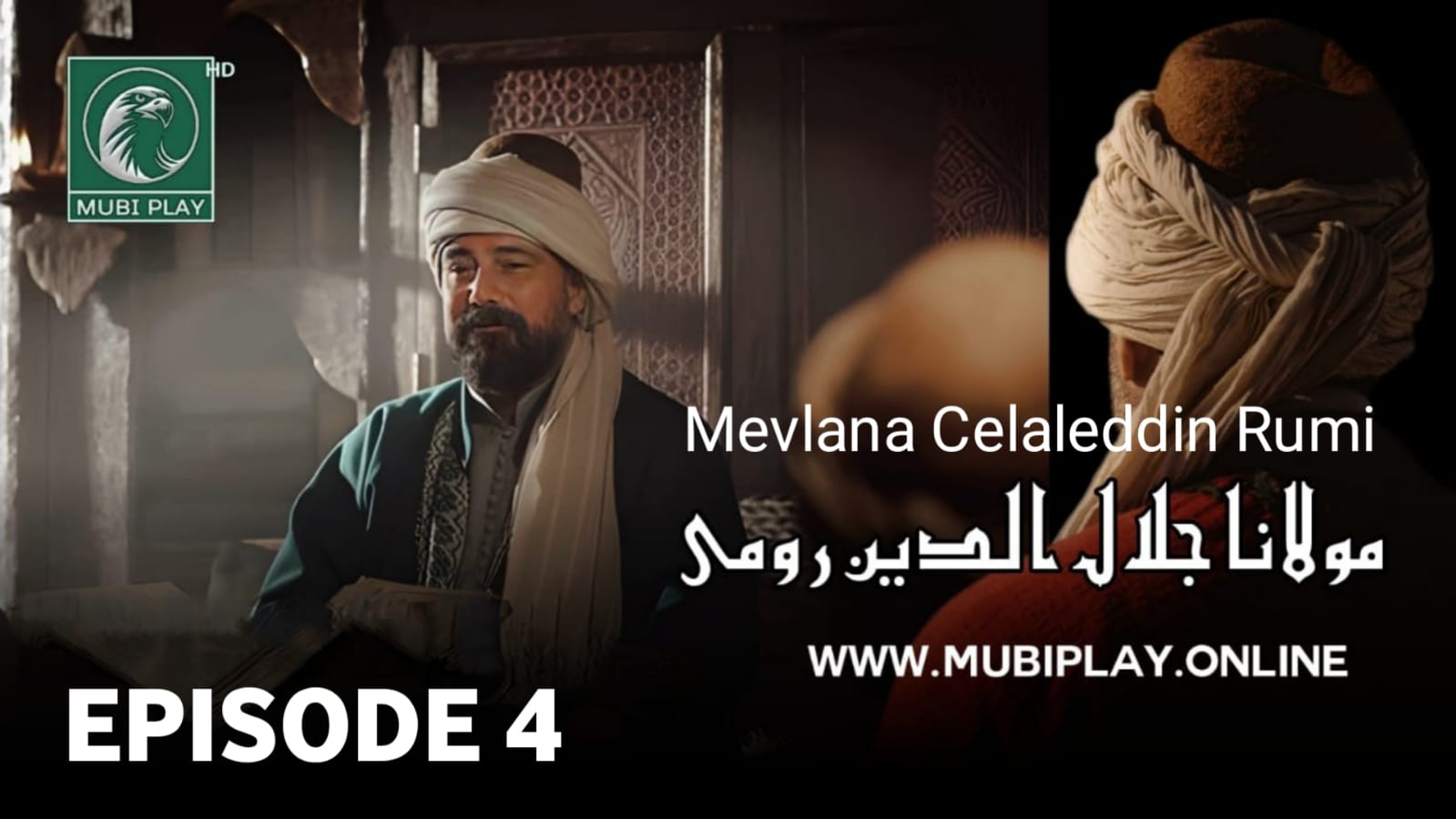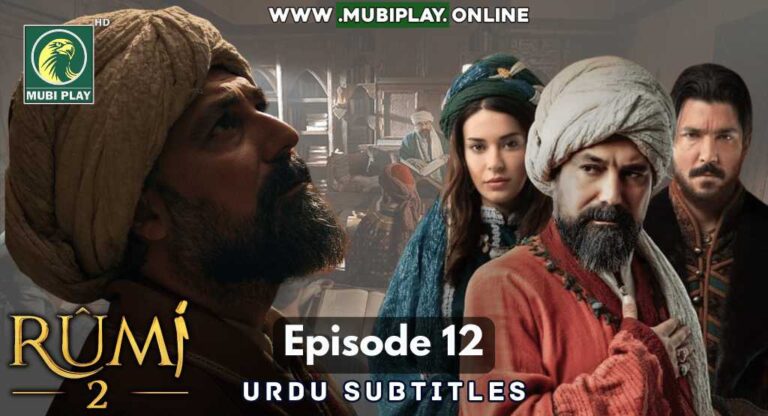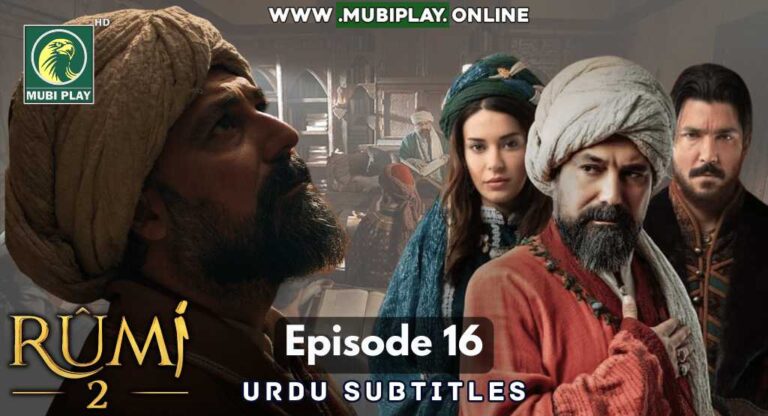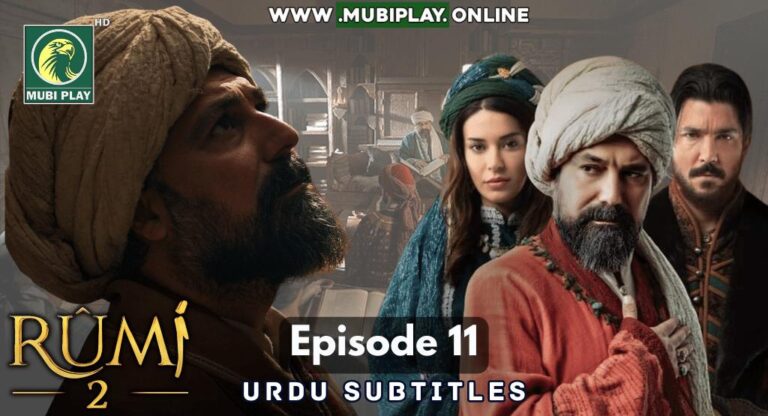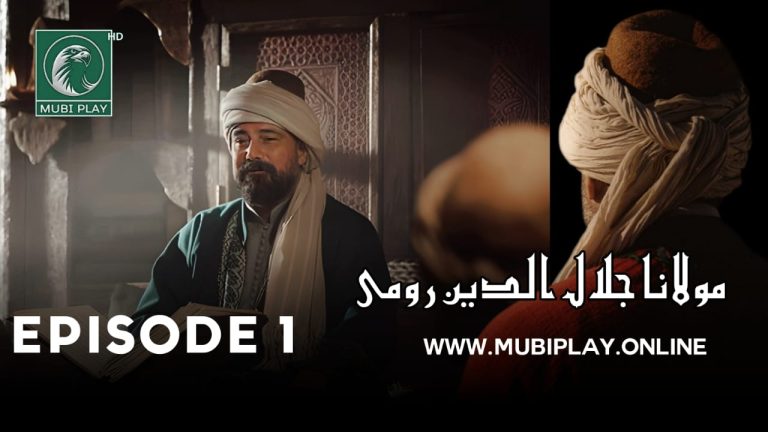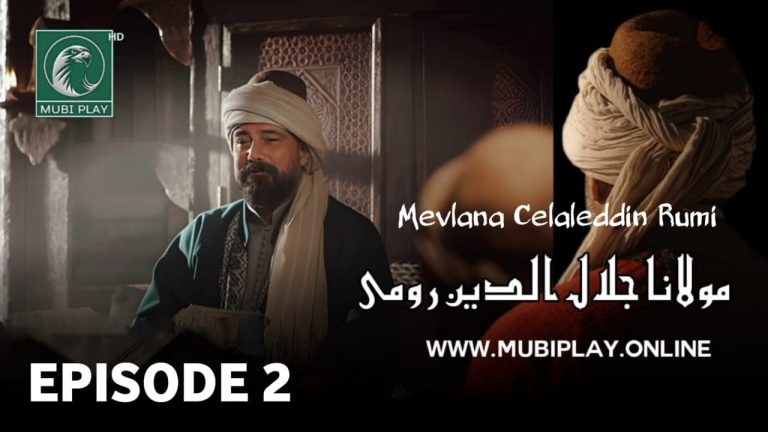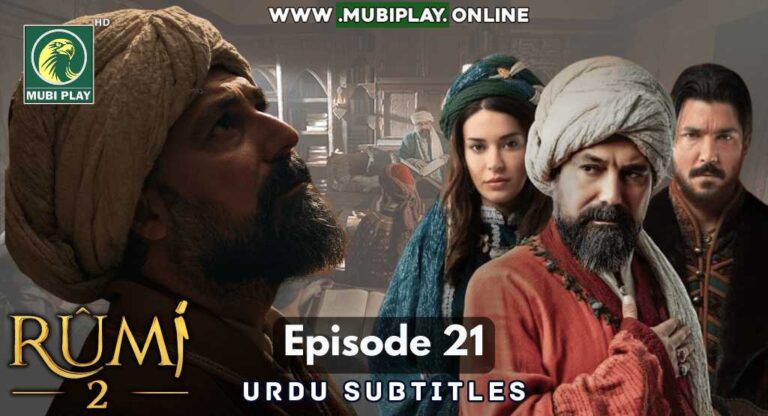Mevlana Celaleddin Rumi Episode 4
Mevlana Celaleddin Rumi, the 13th-century poet, philosopher, and scholar, continues to inspire and captivate people with his words and teachings. In this fourth episode of our journey into the world of Mevlana, we will delve deeper into his life, works, and legacy. Join us as we explore the mystical realm of Mevlana Celaleddin Rumi. Now you can enjoy Mevlana Celaleddin Rumi Episode 4 with Urdu and Subtitles.
Mevlana Celaleddin Rumi Episode 4 Urdu Subtitles: Introduction
Mevlana Celaleddin Rumi, also known as Jalaluddin Rumi, was born in 1207 in Balkh, which is now part of Afghanistan. He lived most of his life in Konya, Turkey, where he founded the Mevlevi order, also known as the Whirling Dervishes. His poetry and teachings have transcended time and geography and continue to inspire millions of people around the world. In this article, we will discuss the life, works, and teachings of Mevlana Celaleddin Rumi in detail.
Mevlana Celaleddin Rumi Episode 4 English Subtitles: The Life of Mevlana Celaleddin Rumi
Mevlana Celaleddin Rumi was born into a family of scholars and religious leaders. His father, Baha Walad, was a famous theologian and mystic, and his family was well-known for their knowledge of Islamic law and theology. When Mevlana was young, his family moved to Konya, where his father became a teacher at a madrasa, an Islamic school.
Mevlana grew up in a highly intellectual and religious environment and was trained in Islamic law, philosophy, and theology. He also studied poetry and music, which would later become essential components of his teachings. At the age of 24, Mevlana met a wandering dervish named Shams al-Din, who would become his spiritual mentor and close friend.
Shams al-Din introduced Mevlana to the mystical path of Sufism, which emphasizes the inner, spiritual dimension of Islam. Mevlana was profoundly influenced by Shams al-Din’s teachings and became a devout disciple. Their intense spiritual relationship, however, caused controversy and opposition from Mevlana’s family and followers.
Despite this opposition, Mevlana continued to follow his spiritual path and founded the Mevlevi order in Konya. The order emphasized the importance of spiritual discipline, meditation, and music as a means of attaining union with the divine. Mevlana also wrote extensively on Sufism and poetry, which would later become some of the most famous works of Persian literature.
Watch Mevlana Celaleddin Rumi Episode 4 in Urdu: Mevlana Celaleddin Rumi’s Works
Mevlana Celaleddin Rumi’s works are a testament to his spiritual depth, poetic genius, and philosophical insight. His poetry is characterized by its simplicity, elegance, and emotional intensity. It speaks to the universal human experience of love, longing, and spiritual yearning.
Mevlana’s most famous work is the “Masnavi,” a collection of poems that express the central themes of Sufism, including the love of God, the pursuit of spiritual perfection, and the importance of self-knowledge. The Masnavi is considered one of the greatest works of Persian literature and has been translated into many languages.
Another notable work by Mevlana is the “Divan-e Shams-e Tabrizi,” a collection of poems dedicated to his spiritual mentor, Shams al-Din. These poems express Mevlana’s love and devotion to Shams al-Din and his deep spiritual insights.
Mevlana Celaleddin Rumi Episode 4 Urdu: The Legacy of Mevlana Celaleddin Rumi
Mevlana Celaleddin Rumi’s legacy extends far beyond his literary works. His teachings have inspired a spiritual and cultural movement that has lasted for centuries. The Mevlevi order that he founded continues to exist to this day, and the Whirling Dervishes, a form of meditation and dance that is associated with the order, has become a symbol of Turkish culture.
Mevlana’s poetry has also had a profound influence on Persian literature and culture. His works have been translated into many languages and have been widely read and studied around the world. His ideas about love, spirituality, and human nature continue to resonate with people from all walks of life and have inspired many to embark on their own spiritual journeys.
Maulana Jalaluddin Rumi Episode 4 Urdu Subtitles:
In this episode of our journey into the world of Mevlana Celaleddin Rumi, we will focus on some of his lesser-known works and teachings. We will explore the themes of death, grief, and the afterlife in Mevlana’s poetry and discuss their relevance to our modern-day lives.
Mevlana Celaleddin Rumi Episode 4 with Urdu Subtitles
PLAYER 1
PLAYER 2
Death and the Afterlife in Mevlana’s Poetry
Mevlana Celaleddin Rumi’s poetry often explores the themes of death and the afterlife. He views death not as an end, but as a transition from one form of existence to another. He believes that the soul continues to exist after death and that the afterlife is a realm of spiritual growth and enlightenment.
In one of his poems, Mevlana writes:
“Death is not extinguishing the light; It is only putting out the lamp Because the dawn has come.”
This poem expresses Mevlana’s belief that death is not something to be feared, but rather a natural part of the cycle of life. He believes that the soul is immortal and that death is simply a transformation from one state of being to another.
Grief and Loss in Mevlana’s Poetry
Mevlana Celaleddin Rumi’s poetry also explores the themes of grief and loss. He believes that these emotions are a natural part of the human experience and that they can be a means of spiritual growth and transformation.
In one of his poems, Mevlana writes:
“The wound is the place where the light enters you.”
This poem expresses Mevlana’s belief that our deepest wounds and losses can be a source of spiritual awakening. He believes that through our pain and suffering, we can learn to let go of our attachments and ego-driven desires and connect with our true selves and the divine.
The Relevance of Mevlana’s Teachings Today
Mevlana Celaleddin Rumi’s teachings are just as relevant today as they were centuries ago. In a world that is often filled with turmoil, conflict, and suffering, his message of love, compassion, and spiritual growth is more important than ever.
Mevlana’s teachings can help us to connect with our inner selves and find meaning and purpose in our lives. His poetry can inspire us to see the beauty and interconnectedness of all things and to cultivate a sense of awe and wonder at the mystery of existence.
Death and the Afterlife in Mevlana’s Poetry
Mevlana Celaleddin Rumi’s poetry often explores the themes of death and the afterlife. He views death not as an end, but as a transition from one form of existence to another. He believes that the soul continues to exist after death and that the afterlife is a realm of spiritual growth and enlightenment.
In one of his poems, Mevlana writes:
“Death is not extinguishing the light; It is only putting out the lamp Because the dawn has come.”
This poem expresses Mevlana’s belief that death is not something to be feared, but rather a natural part of the cycle of life. He believes that the soul is immortal and that death is simply a transformation from one state of being to another.
Grief and Loss in Mevlana’s Poetry
Mevlana Celaleddin Rumi’s poetry also explores the themes of grief and loss. He believes that these emotions are a natural part of the human experience and that they can be a means of spiritual growth and transformation.
In one of his poems, Mevlana writes:
“The wound is the place where the light enters you.”
This poem expresses Mevlana’s belief that our deepest wounds and losses can be a source of spiritual awakening. He believes that through our pain and suffering, we can learn to let go of our attachments and ego-driven desires and connect with our true selves and the divine.
The Relevance of Mevlana’s Teachings Today
Mevlana Celaleddin Rumi’s teachings are just as relevant today as they were centuries ago. In a world that is often filled with turmoil, conflict, and suffering, his message of love, compassion, and spiritual growth is more important than ever.
Mevlana’s teachings can help us to connect with our inner selves and find meaning and purpose in our lives. His poetry can inspire us to see the beauty and interconnectedness of all things and to cultivate a sense of awe and wonder at the mystery of existence.
FAQs about Maulana Jalaluddin Rumi Episode 4 in Urdu:
Q: Where can I watch Mevlana Celaleddin Rumi Episode 4 with English Subtitles?
A: Mevlana Celaleddin Rumi Episode 4 with English Subtitles is available to watch on Mubi Play
Q: Where can I watch Mevlana Celaleddin Rumi Episode 4 with Urdu Subtitles?
A: You can watch Mevlana Celaleddin Rumi Episode 4 with Urdu Subtitles on MubiPlay
- What is the significance of the Mevlevi order in Islam? The Mevlevi order, founded by Mevlana Celaleddin Rumi, emphasizes the inner, spiritual dimension of Islam and uses music and dance as a means of achieving spiritual union with the divine.
- What is the Masnavi? The Masnavi is a collection of poems by Mevlana Celaleddin Rumi that expresses the central themes of Sufism, including the love of God, the pursuit of spiritual knowledge, and the importance of ethical behavior.
- What is the Whirling Dervish? The Whirling Dervish is a form of meditation and dance that is associated with the Mevlevi order. It involves spinning around in circles while focusing on the divine and is intended to lead to a state of spiritual ecstasy.
- What is the significance of Mevlana’s poetry? Mevlana’s poetry is considered to be some of the greatest works of Persian literature and has had a profound influence on Islamic culture and spirituality. His ideas about love, spirituality, and human nature continue to resonate with people from all walks of life and have inspired many to embark on their own spiritual journeys.
- How can Mevlana’s teachings help us in our daily lives? Mevlana’s teachings can help us in many ways in our daily lives. They can teach us to cultivate compassion and empathy towards ourselves and others, to let go of our attachments and ego-driven desires, and to live in the present moment. By following his teachings, we can learn to connect with our inner selves, find meaning and purpose in our lives, and develop a deeper sense of gratitude and appreciation for the world around us.
- What is the importance of Mevlana’s teachings in today’s world? In today’s world, Mevlana’s teachings are more important than ever. In a world that is often filled with division, conflict, and suffering, his message of love, unity, and spiritual growth can help to bring people together and promote greater understanding and compassion. His teachings can help us to transcend our differences and connect with the divine essence that exists within all of us.
Conclusion of Maulana Jalaluddin Rumi Episode 4 English Subtitles:
Mevlana Celaleddin Rumi’s teachings and poetry continue to inspire and enlighten people from all over the world. His message of love, compassion, and spiritual growth is just as relevant today as it was centuries ago. By following his teachings, we can learn to connect with our inner selves, find meaning and purpose in our lives, and cultivate a greater sense of empathy and compassion towards others. In a world that is often filled with turmoil and suffering, Mevlana’s teachings can help us to find peace, hope, and spiritual growth.
So, let us all take a moment to reflect on Mevlana’s teachings and how they can help us in our daily lives. Let us embrace his message of love, compassion, and spiritual growth, and work together to create a more peaceful, loving, and harmonious world for all.
The Mevlana Celaleddin Rumi Episode 4 has taken us on a journey into the world of Mevlana’s lesser-known works and teachings. We have explored the themes of death, grief, and the afterlife in Mevlana’s poetry and discussed their relevance to our modern-day lives. We hope that this episode has inspired you to continue your own spiritual journey and to seek out the wisdom and teachings of Mevlana Celaleddin Rumi.

